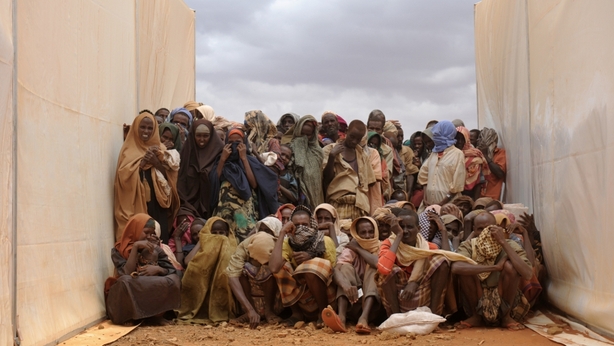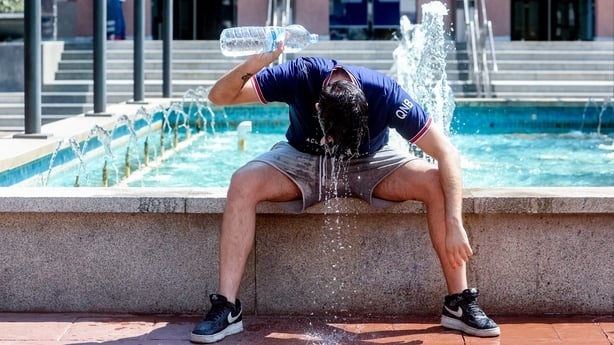Human-caused climate change intensified all of the ten most deadly extreme weather events of the past 20 years and contributed to more than 570,000 deaths, according to a scientific study.
The ten most deadly weather events of the past twenty years included three tropical cyclones, four heatwaves, one drought and two major floods, according to the International Disaster Database.
In all cases according to this study they were made more intense, more likely, and more deadly by 250 years of atmospheric warming caused by humans burning oil, gas and coal as well as deforestation.
The report said climate change is already incredibly dangerous at 1.3 degrees of warming and nowhere is safe.
Strengthening homes and flood defences, improving early warning systems, and protecting vulnerable people are among the top actions needed to prepare for increased extreme weather according to the report.

Although officially well over half a million deaths were attributed to these ten events, the scientists at World Weather Attribution say that figure is a major underestimate.
The authors said there may have been millions more heat-related deaths not counted in official statistics.
For instance, fatalities linked to heatwaves are not routinely recorded in much of the world, especially in poorer countries that are most vulnerable to high temperatures.
The 2011 drought in Somalia that killed 258,000 people was the deadliest extreme weather event over the past twenty years.
The study confirms that climate change was the root cause of why it was so deadly.
The fourth was the 2022 heatwave in Europe with 53,542 fatalities, and weather extremes that were made 17 times more likely and up to 3.6 degrees Celsius hotter because of climate change.

The scientists said examples like these show that nowhere in the world is safe from climate change, with large death tolls from extreme weather already observed in rich and poor countries alike.
The study highlights the danger of extreme weather today, with 1.3 degrees Celsius of warming, and the urgency of replacing fossil fuels with renewable energy.
It says the world is on track to experience between 2.6 and 3.1 degrees Celsius of warming by the end of this century.
Warming is likely to surpass 1.5°Celsius by the mid-2030s, which would see continents battered by increasingly dangerous heat waves, droughts, wildfires and storms.
Read more about climate change
Dr Friederike Otto, Co-founder and Lead of World Weather Attribution at the Centre for Environmental Policy, at Imperial College London, said:
"This study should be an eye-opener for political leaders hanging on to fossil fuels that heat the planet and destroy lives. Climate change isn't a distant threat. It worsened extreme weather events that left more than 570,000 people dead. If we keep burning oil, gas and coal, the suffering will continue."
Mr Otto added that all countries need to ramp up efforts to adapt to extreme weather.
"We have the technology and knowledge to replace fossil fuels with renewable energy, lower demand and build a safer, healthier world. But we need political leaders to step up and make it happen."
The report calls for early weather warning systems to be implemented, the resilience of cities to be boosted, for authorities to ensure that infrastructure can cope with the changed climate, and for the people most at-risk to be protected and supported.
However, the researchers also warn that some events are becoming so extreme it may not be feasible to adapt fast enough as people and places reach the limits of adaptation, and these events will become more frequent as long as fossil fuel emissions heat the climate.
'Debate is now over'
A climatologist has said that "the debate is now over" in terms of climate change's role in intensifying weather events.
Speaking on RTÉ’s Today with Claire Byrne programme, John Sweeney, Climatologist and Emeritus Professor at Maynooth University said that there is a "fingerprint" of climate change in almost every extreme weather incident.
Mr Sweeney said that death tolls following these weather events are often "vast" underestimations.
"In many developing countries, you don’t register heatwave deaths," he said.
"We don’t register things like vectors, diseases that may be associated with the movement of climate belts further poleward."
He said that while communication and adaptation can help in preventing devastation in extreme weather events, the goal should be preventative action.
"We need to realise that, unless we tackle the problem at source in reducing our greenhouse gas emissions, then all of those will come to naught at the end of the day," said Mr Sweeney.
"The takeaway message is that, if we want to avoid these in the future, we have to do a lot more in terms of protection."
Mr Sweeney added that Europe will see more diseases moving into the region as a result of intense weather events.
"Those are issues which are going to magnify the climate effect further," he said.
"Climate is the great multiplier of existing threats."
He confirmed that there are worse weather events to come as a result of increasing temperatures.
"We know from the buildup to COP29 that global emissions increased again last year, so we’re not making progress in this problem," said Mr Sweeney.
"Even within Ireland, we’re not really facing up to meeting our own carbon budgets."
Climate change makes extreme weather events 'more extreme'
A weather expert said that the extreme weather events are "made even more extreme" by climate change.
Speaking on RTÉ's Morning Ireland programme, Keith Lambkin, Climatologist with Met Éireann, said the extent that climate change affected Spain's recent flash floods has still to be confirmed.
"Climate change can increase the envelope of possibilities and it’s at this extreme end that the real danger happens," he said.
It is at this extreme end that people lose their lives."
We need your consent to load this rte-player contentWe use rte-player to manage extra content that can set cookies on your device and collect data about your activity. Please review their details and accept them to load the content.Manage Preferences
Mr Lambkin explained that regions have unique characteristics which affect the weather and climate.
"In Spain, on the east coast next to the Mediterranean, the terrain and conditions are such that it can create weather patterns where very warm, moist air can get forced upwards by colder air blowing underneath it," he said.
"This rapidly rising warm, moist air can create very intense rain clouds that drop down."
"What happened in this situation is that with a lack of strong winds, we can almost get this conveyor belt approach where we’re getting an awful lot of warm, moist air being pushed up, and these very intense rainfall patterns."
He said that "compound events", where multiple factors come together to influence weather, make conditions worse.
"With the harder ground, with a lack of soakage... these compound events can lead to more extreme situations as we saw in this particular case," said the expert.
Mr Lambkin said that additional greenhouse gases created extra heat in the atmosphere, which has caused consequences – in this case, extreme rain.
"That extreme rain is causing knock-on consequences related to flooding and moving rivers," he said.
"These are knock-on cascading events that have come from the primary weather conditions, and we can see things potentially getting worse as these compound events increase."
"The more rain we get, the more consequences we get."
"It's those knock-on consequences which cause the devastating damage."








